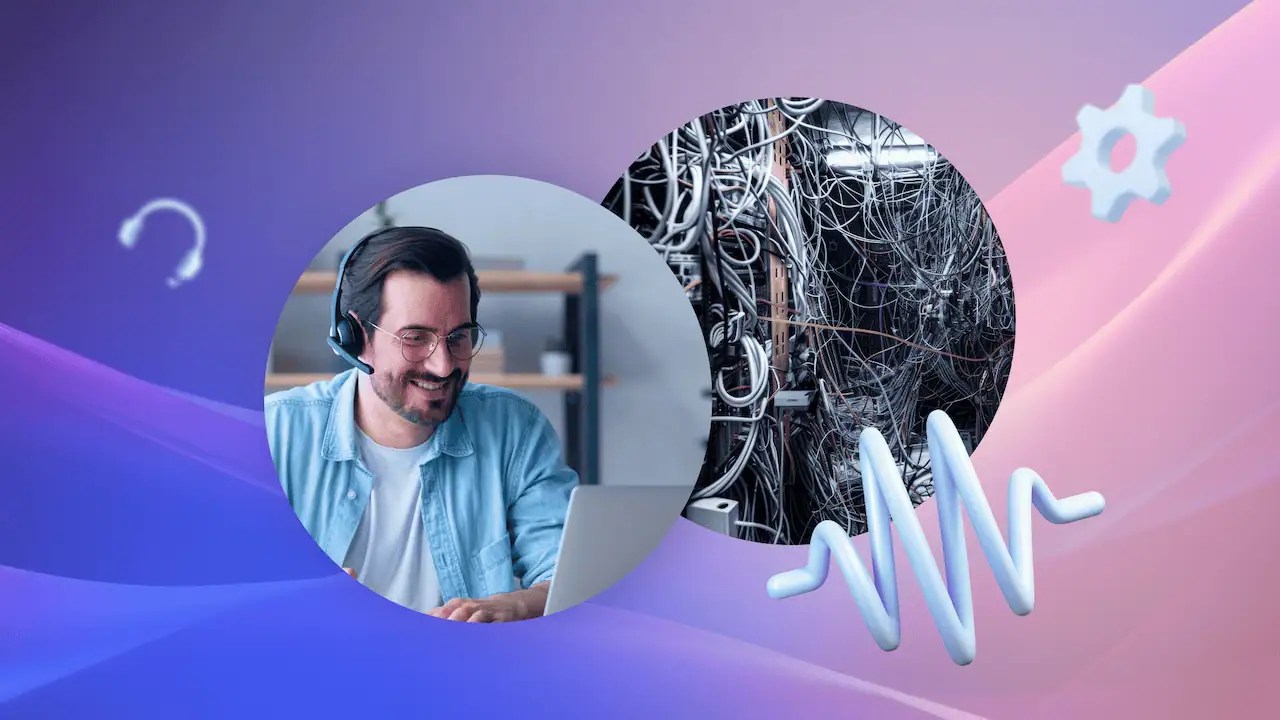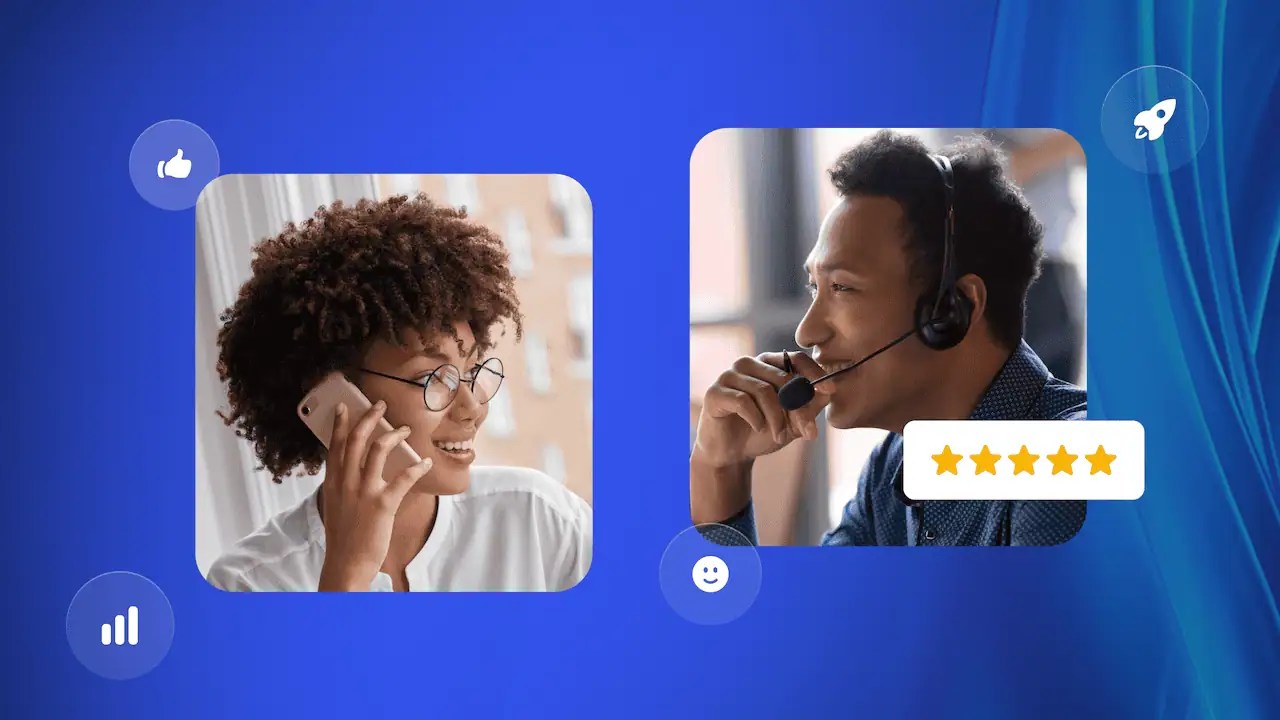You can learn a lot from a single sales or customer service call.
When listening back to the recording, you can discover what drove the customer to get in touch, what pain point they needed to resolve, and how your team or the contact center handled the call.
You can gain invaluable insights into your overall customer experience and spot new key opportunities for everything from business improvement to product development.
Recording customer service calls can help you improve the customer experience, your contact center training programs, and even the business itself. Knowing how and when to record customer service calls is the first step.
Why Should You Record Your Customer Service Calls?
Call recordings offer diverse benefits for multiple departments and may improve workflow for customer service, sales, marketing, and more.

Gain customer insights and feedback
Call recording playback can provide invaluable insights for your business.
Listening to a sales call recording, for example, can help you better understand:
- Your customers’ needs, preferences, and pain points.
- The competitors your customers are considering.
- Any customer objections, including price, product functionality, or contract terms.
- Customer opinions about your brand or product.
Customer service call recordings can offer many similar insights, and they can also help you determine the following:
- What their experience with your brand or product is like.
- What concerns or negative experiences they may have.
- Where your product or service could be improved.
This information can help refine products, services, and the customer experience overall.
Call recordings are commonly used to collect and distribute feedback throughout the entire company, including product, sales, marketing, and other customer-centric teams.
Achieve call center quality assurance
Call centers are valuable partners for many businesses, but it’s important to monitor call center performance regularly to ensure that your customers are receiving the kind of experience you want to create for them.
For this reason, many call center phone systems have call recording as a built-in feature, allowing businesses to access not only phone logs but also the actual recordings.
Someone from your business can review these recordings to identify where representatives may need additional training or where you can modify scripts. In the process, call center quality assurance practices can maintain and improve customer service standards.

Guard against costly customer disputes
The old saying, “The customer is always right,” is great in theory, but doesn’t always work out in practice. Customers are sometimes wrong and, sometimes, they intentionally lie.
Call recordings of customer phone conversations provide legal protection for your business, particularly when you need hard proof of what was discussed or agreed upon.
Some industries may require call recording, and adhering to those requirements is essential.
Demonstrate real calls for team training and development
Real calls are often used for training new and existing employees. They can demonstrate effective communication and problem-solving without the need for shadowing star employees, which may only slow them down.
Managers often listen to random samples of their team’s calls to monitor performance and look for growth opportunities. Call recordings may also be used in employee performance reviews, where the manager notes commendable reviews or points out areas for potential improvements.

3 Benefits of Using VoIP for Recording Customer Service Calls
VoIP phone systems often have built-in call recording features, making it easy for businesses to track calls made to and by their service reps.
1. Boosted efficiency and scalability
VoIP systems seamlessly integrate with your existing customer service platforms, automating recording and eliminating the manual setup or data transfer processes. When combined with automatic call recorder features, these integrations make it nearly effortless to record business calls.
You can easily scale recording capabilities as your business grows without needing heavy investments in new hardware, as the data storage is all digital.
And, since everything is available through the internet, you can listen to recorded calls from anywhere you can get a signal. This significantly improves collaboration potential and boosts remote work flexibility.
2. Improved customer service and security
VoIP phone systems are well known for high audio quality during business calls, and that quality carries over to audio recordings, too.
Capture high-quality audio for accurate recording analysis, which can be used for the following purposes:
- Ensure clear records for dispute resolution if your business needs it.
- Assess overall agent performance and provide training where needed.
- Ensure that all customer service agents adhere to your company’s standards.
- Assess customer language and tone to understand overall call sentiment.
- Personalize future interactions based on the initial customer call to boost customer satisfaction.
It’s also worth noting that a customer with secure data is a happy customer. VoIP systems allow you to store recordings with advanced encryption and access controls, putting data privacy front and center.
3. Unlocked data-driven insights
Call recordings provide clear insights from qualitative data.
You can better identify patterns in customer pain points, particularly regarding recurring issues, and spot real opportunities for improvement that can directly impact CX overall.
You can also better track key metrics such as call duration, resolution rate, and customer satisfaction when you can hear the solutions playing out in an audio file.
Call recordings provide insights into your target customers’ needs so that you can proactively address potential issues. These insights are concrete and actionable and have the potential to increase customer satisfaction and retention.
How to Record Customer Service Calls
When using a VoIP phone system, there are typically three different options for recording customer service calls.
- Automatic recording: Configure your phone system or call center software to record one or more agents’ phone calls. This is useful for previous call reviewing, call center coaching, and CX improvement programs. It takes the hassle out of call recording by just recording all calls.
- On-demand recording: Supervisors can record calls happening in real time or calls made by select users over a given period. It’s useful for team managers and coaches looking to review calls from select team members in a given period.
- On-demand, user-initiated recording: Call center agents can start, pause, and cancel call recordings using specific keypresses on their dial pad. This is particularly useful for regulated industries where sensitive information that should not be recorded may be shared.
Nextiva’s VoIP system offers each of the above call recording options, giving your customer service teams flexibility based on their needs.

Best Practices When Recording Customer Service Calls
When using a call recording system, there are some best practices to consider that will keep you legally protected, your data secure, and, most importantly, your customers happy and protected from identity theft.
Inform callers
You should always inform customers that the call is being recorded for both ethical and legal considerations.
This starts with call recording laws.
Some states have a one-party consent law, which means you’re clear as long as one party knows and consents to the call recording.
Other states, however, have two-party consent laws that require all parties to be informed and agree to a call recording, noting a reasonable expectation of privacy. Two-party consent states for call recordings include:
- California
- Connecticut (though this state has one-party consent for in-person conversations)
- Delaware
- Florida
- Illinois
- Maryland
- Massachusetts
- Montana
- Nevada
- New Hampshire
- Oregon
- Pennsylvania
- Washington
Know your state laws, but as a general practice, standard ethical and legal advice will require you to inform all parties about the audio recording. Write it into the beginning of your scripts as a friendly disclaimer, and many customers won’t even notice.
Regularly review recorded customer calls
If you’ve gone through the hassle of recording phone calls, take the time to listen to those recorded conversations regularly. Doing so allows you to monitor overall customer service quality, track patterns or trends in customer complaints or concerns, and gain insights into the customer experience. Most call center tools will also be able to take notes on calls.

By reviewing recorded business calls regularly, you’ll learn more, spot potential problems more quickly, and adapt faster by incorporating your insights into training programs and script adjustments.
Create secure access and retention policies
When you’re using call recording software, it’s crucial to ensure those audio files are secure. Many call center tools or VoIP phone systems have built-in security features, but you should also confirm that your storage is secure.
You do want the appropriate team members to be able to access those calls, but you don’t want anyone else getting them — particularly if you’re in a regulated industry such as healthcare, which must be HIPAA-compliant.
Establish clear, documented policies regarding the following:
- How long are calls retained, when are they deleted, and is deletion automatic or a team member’s responsibility?
- Where recordings are stored, which individuals or roles can access them, and how access is granted.
- How access will be revoked if authorized personnel switch roles or leave the company.
- Which data protection regulations are used to safeguard customer information, particularly those required by federal law or industry regulations.
Share call recordings with team members
Relevant team members should have convenient access to call recordings as needed while still ensuring the audio files’ security. Authorized personnel should receive training on how to access the recordings, how to choose which recordings to listen to, and what they can learn from them.
For example, customer service managers may want to assess how a call center’s agents handle frustrated customers via inbound calls. The sales manager, meanwhile, may be interested in assessing the quality of existing call center campaigns.
When sharing call recordings with team members or call centers, you can use snippets to protect the customer’s identity and sensitive information while still using the call for training purposes.

Apply insights to improve customer experience
If a customer has a problem with your product or service, you’re not likely to hear about it through the marketing, sales, or product departments; you’ll find out through customer service.
Call recordings provide extraordinary insights into your business’s customer experience, including their contact with your customer service team.
You may learn that customers call in because they’re confused by the website or cannot order online due to a nonfunctional checkout page. Or they may be calling because they failed to get the results promised to them by the sales department.
You may also discover that the call center you’ve hired isn’t living up to its promises, even if its baseline call center metrics of call answers or call minutes are good. The staff may seem impatient or dismissive or fail to use the correct brand language you’ve defined for them.
Incorporate your insights across your entire business because what you learn can go beyond just the support call. You can also use those customer experience insights to enhance sales, marketing, and product functions.
Related: How Call Center Recording Software Is Changing
Record Customer Calls Effortlessly With Nextiva
Call recording can significantly improve the customer experience, including their experience when they call your support line. Your sales, marketing, and product teams can all learn from the insights gained from recorded calls, making them well worth reviewing.
Because recorded calls are so valuable, choosing a VoIP provider that prioritizes call and audio file quality, data privacy, and ease of management for your team is crucial.
Nextiva is the go-to VoIP phone system for small businesses and high-growth contact centers (and everything in between) thanks to the following:
- Effortless setup: Integrate with your existing system, auto-record calls, and organize them easily.
- Flexible options: Choose between recording all calls, specific calls, conferences, or certain types of calls.
- Focus on security and compliance: Store data securely, manage access and consent, and redact sensitive information to comply with industry and federal regulations and best practices.
- Powerful, accurate insights: Transcribe calls, connect with analytics tools, and understand customer sentiment and agent performance transparently like never before.
- Cost effectiveness: Call recording is a built-in feature of Nextiva’s VoIP system, meaning no extra fees.
Related: Call Center Recording Software Pros, Cons, and Use Cases
The best call center software is here.
Handle inbound calls effortlessly with Nextiva Contact Center. Get call recording, automation, and AI in one platform.





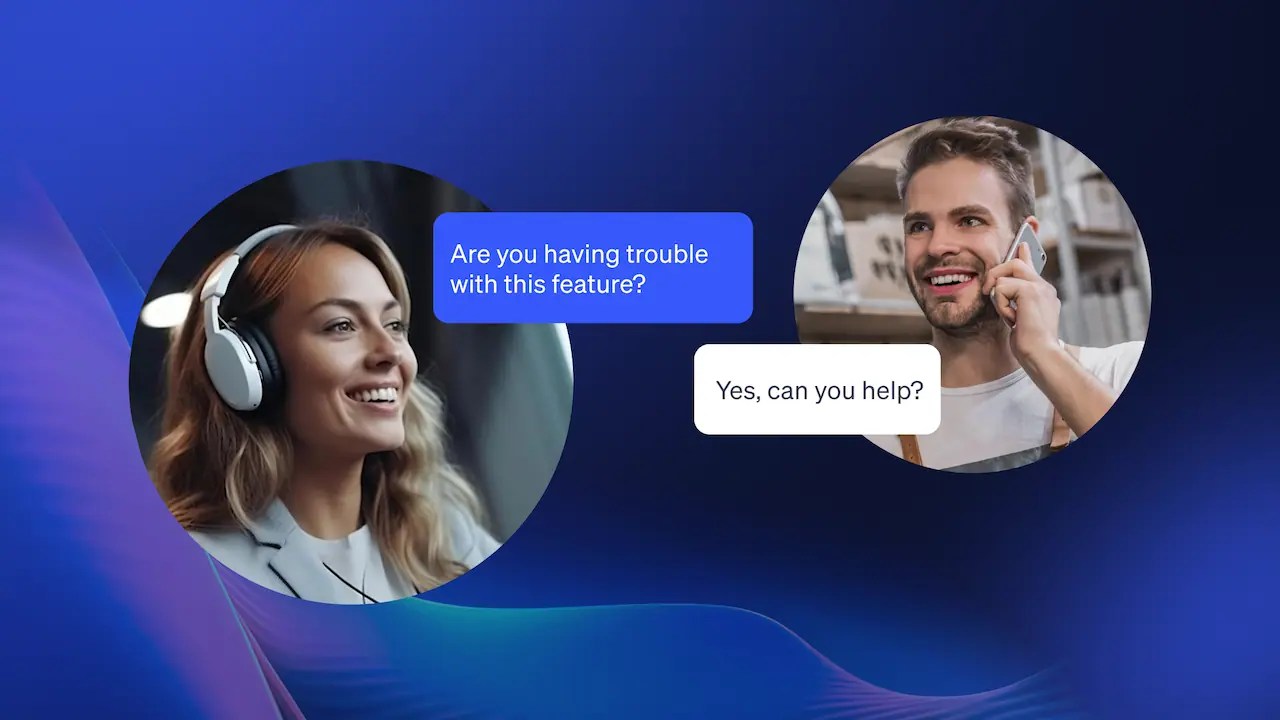
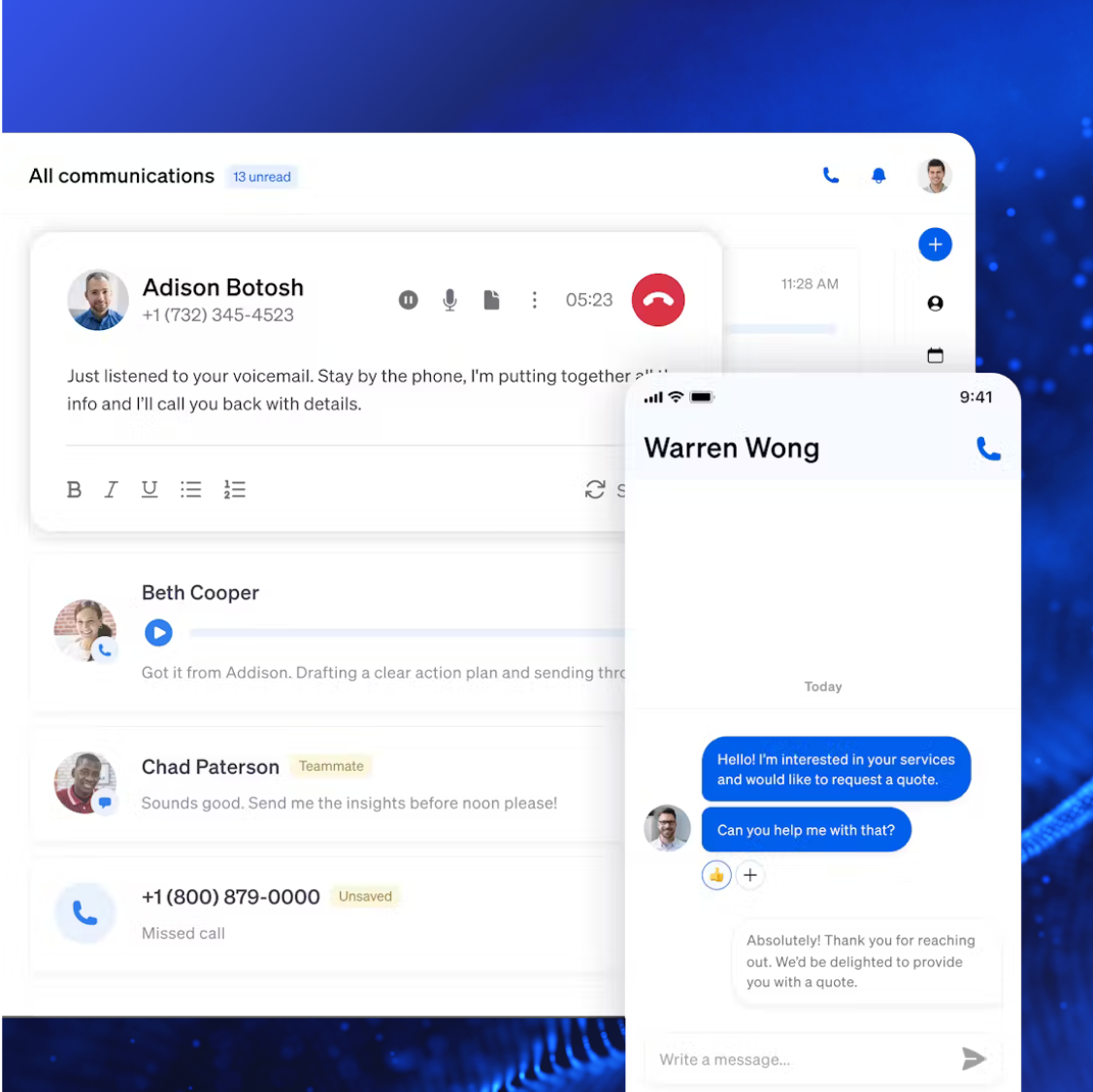
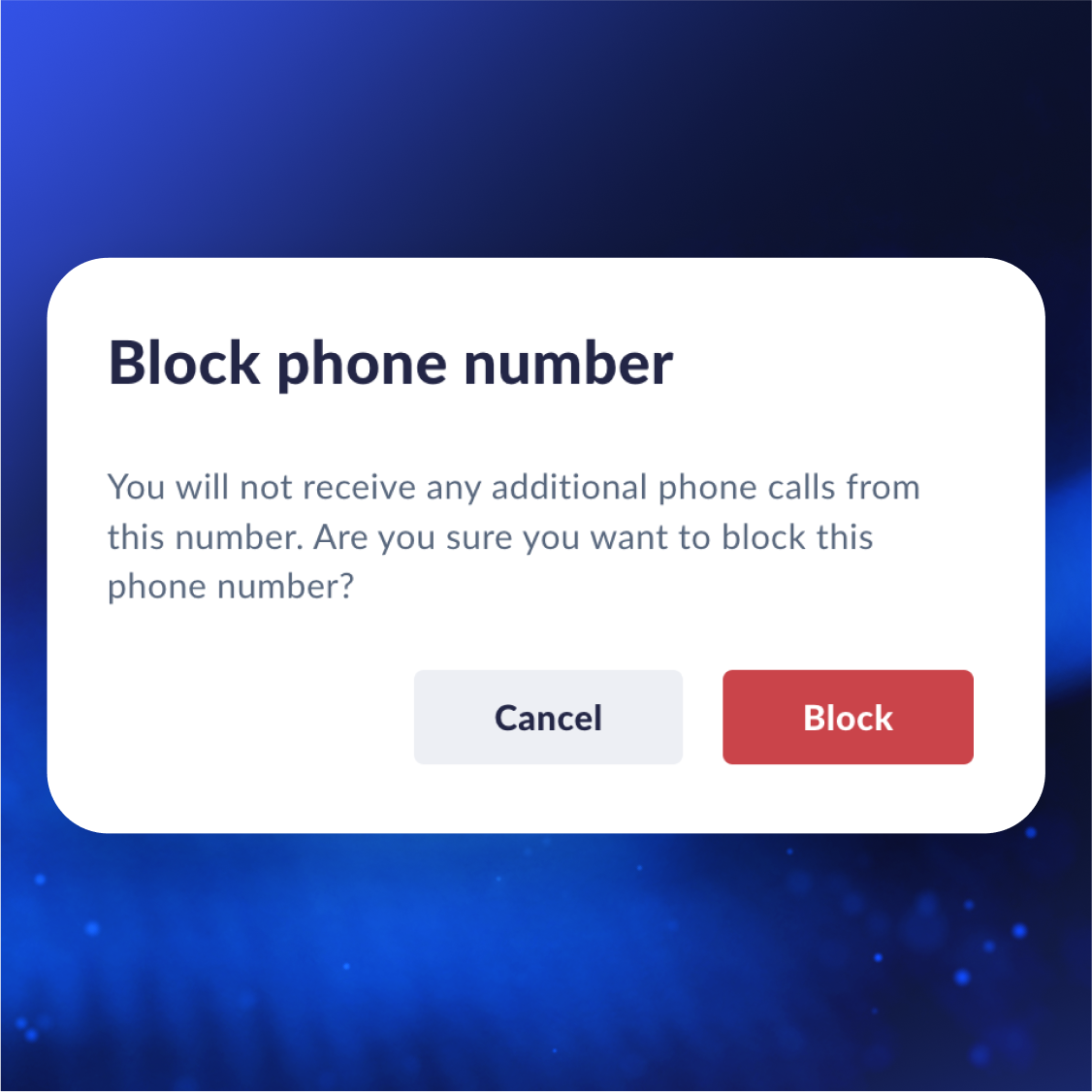







 Customer Experience
Customer Experience 






